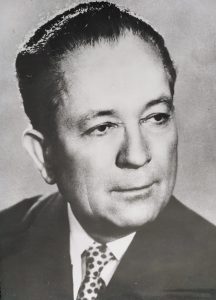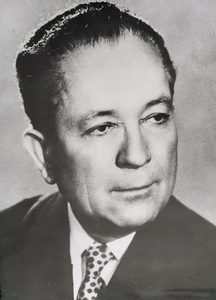
Grigore Geamănu (1903-1985) was a Romanian legal scholar and diplomat who authored the first textbooks and treaties on international law ever published in post-1945 Romania. He played an important role in the development of this discipline in Romania, although through the lens of state socialist doctrines. He graduated in law from Bucharest University in 1928 and defended a PhD thesis in Paris in 1933 on „Resistance to Oppression and the Rights to Insurrection”, taking a leftist approach inspired by Karl Kautsky. Member of the National Peasant Party during the interwar period, he joined the Communist Party in 1945 and was co-opted by the new authorities in important public functions, such as member of the communist parliament (1946 and 1969), dean of the Law Department at Bucharest University (1958 and 1959), and ambassador in Switzerland (1959-1962) and Turkey (1968-1971). Already in 1934, Geamănu had enrolled for one year at the Hague Academy of International Law. Back in Switzerland after the Second World War, first as ambassador then as Romania’s representative at the Hague Arbitrage Court (1965-1971), he specialised in international law and militated for the introduction of this discipline in the Romanian curriculum. In 1965, Geamănu published the first Romanian textbook on public international law, followed in 1981 by the first Treaty on the topic. In 1977 he authored the only Romanian book on international criminal law published during the communist period. Member of the Romanian Academy of Science, he was a founding member of the Romanian Association of International Law and International Relations (ADIRI), which he headed from 1981 to 1985.
Geamănu is considered a key figure of legal education and scholarship of international law in communist Romania, given his textbooks and treatises on the topic. Geamănu adopted the state socialist visions on strict national sovereignty and opposition to the regulation of conflicts between states and their citizens through international law. However, he introduced to Romanian audience the works of prominent Western legal scholars, such as Donnedieu de Vabres, Hans Kelsen, René Cassin, Stefan Glaser etc, and Third world scholars such as Indian Nagendra Singh. In contrast to other Romanian socialist scholars, who built mainly upon the legal thinking of Soviet experts, Geamănu largely quoted and explained the evolution of Western schools of international law. He also played an important role in the rehabilitation of Vespasian Pella, a prominent legal expert who represented Romania at the League of Nation and advocated both during the interwar period and after 1945 the for the creation of an international criminal court. Pella’s work had been forbidden in Romania after he dissociated himself of the communist regime in the late 1940s. With the rise of national communism in Romania in 1965, Pella was gradually recuperated by the regime and, through Geamănu’s works, presented as a major figure of Romanian international law thinking.
In terms of international criminal justice, while the official state doctrine rejected supranational jurisdictions, Geamănu introduced in his works favourable views on the creation of an international court. First, he talked in a neutral and descriptive way about global efforts to establish an international court in the 1950s and in the 1970s. Second, he openly argued that such a court would be legitimate only if it avoided reproducing the hegemony of big powers in world relations. Writing in 1977 about genocide and apartheid he endorsed the idea of universal jurisdiction for judging these crimes. This principle had been accepted by socialist countries in the 1973 UN Anti-Apartheid Convention but rejected in all the other international instruments concerning major international crimes.
In contrast to other state socialist legal experts, such as Aron Trainin, Manfred Lachs or Emil Stanisław Rappaport, Geamănu did not proposed innovative approaches to international law that impacted global affairs. He had however a formative impact at the national level. He also filtered into socialist legal discourse Western international conceptualizations so as to bolster Romanian autonomy from dependency on Soviet legal thought. In 1976, a review of his work in American Journal of International Law was pointing to his descriptive and neutral (rather than analytical and critical) approach to the history and development of international law. This neutrality must be read, as compromise between the conformity with the communist regime – and subsequent privileges – and the ability to provide information about both Soviet and Western doctrines in a less ideologized way than his contemporary colleagues.
Raluca Grosescu (SNSPA)
Bibliography
-
Dan Ciobanu, „Dreptul International Contemporan (Contemporary International Law). By Grigore Geamanu. Bucharest: Editura Didactica si Pedagogica, 2nd ed., 1975“, American Jourbla of International Law. 70 (1976), pp. 863-864
-
Dutu, Mircea „Grigore Geamănu (1903–1985) personalitate fondatoare a știinţei dreptului internaţional în România“, Studii si Cercetari Juridice, 58 (2) (2013), pp. 499-510
-
Geamănu, Grigore, Dreptul internaţional contemporan (Bucharest: Editura Didactică şi Pedagogică, 1965)
-
Geamănu, Grigore, Tratat de drept internaţional public (Bucharest: Editura Didactică şi Pedagogică 1981)
-
Geamănu, Grigore, Dreptul internaţional penal şi infracţiunile internaţionale (Bucharest: Editura Academiei Republicii Socialieste Romania, 1977)
-
Geamănu, Grigore (1968), Problema înfiinţării unei Curţi penale internaţionale, 1968


